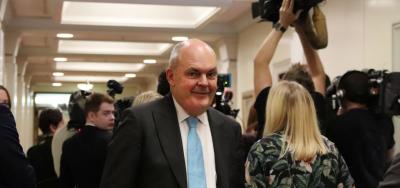If there is any doubt about the hardships that politicians face in a gruelling, high-pressure job, Steven Joyce’s cracking voice and teary eyes should dispel them.
Addressing Parliament on his last day in the building, Joyce diverted from his usual good-natured stoicism as he spoke about the impact nine years as a minister had on his family and his young children in particular.
“They know me as leaving at 5.20 every Monday morning before they wake up, and coming back every Thursday night after they’ve gone to sleep, or on Friday, or on Saturday.
“Then on Saturday and Sunday afternoon they were used to me sequestering myself outside and reading papers for four or five hours each afternoon.”
During the Rena oil spill, his daughter Amelia pointed at images of the disaster on the television, telling her friends, “That’s where my daddy lives.”
It was when speaking about his son that Joyce, briefly, was choked with emotion.
"Tommy doesn't say anything, literally. He's what they call non-verbally autistic.
“He's eight years old, he doesn't have any vocabulary at all, but I know he likes having his dad around - he tells me with his laugh and with his eyes, and now he’s going to have dad around some more.”
A swift rise
The toll of ministerial life came swiftly for Joyce: after reluctantly giving up “the ultimate in work-life balance” at the behest of John Key ahead of the 2008 election, he was given his warrant before even crossing the threshold of the House.
“I was named in the ministry, I was given my office in the Beehive, then somebody said to me, ‘Oh there’s this place called Parliament where they ask you annoying questions and you have to be able to answer them’. I said gosh, that seems a bit inconvenient.”
Inconveniences aside, Joyce swiftly rose to the top of the National government, becoming known as “Mr Fix-It” for his crisis management on a range of issues such as Novopay.
That sense of being driven by pragmatism and projects, rather than any powerful ideological urges, perhaps shone through in Joyce’s self-described highlights.
"Most of the regions don’t actually want a huge amount from Wellington; they actually also don’t want to be told too often they’re struggling by people who never go there.”
Continue here to read the full article by Sam Sachdeva on Newsroom || March 28, 2018 |||





